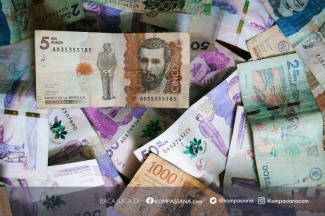At this time global competition occurs in many aspects including the economic aspect, so it is important for every country to maintain its country's economic condition to remain stable while there are many factors that can affect the country's economic condition. These factors need to be properly considered and regulated well so that there are no imbalances and the economy continues to run as it should.
The production factor is one aspect of Indonesia's economic stability among many other aspects. A low level of domestic production will lead to more demand for supplies from abroad so that a lot of expenditure is made in foreign currency which could end in a decrease in the exchange rate of the currency, indicates economic instability in the country. Conditions also cause excessive inflation in a country to cause an economic crisis, which if not handled properly, it will cause economic paralysis and the activities of the people of that country.
To maintain this stability, regulations and systems are needed that are able to control Indonesia's economic conditions in a stable circumstance. In real life, the government has formed a tax system that is enforced with various special functions in the economic field. Taxes are the backbone of the Indonesian economy which plays an important role in building many other aspects of Indonesia, such as education, health and infrastructure. The circulation of money that supports all of these important aspects is very dependent on the economy, especially the large number of state revenue and expenditure budgets, one of which is taxes.
Basically, taxes are mandatory contributions by individuals or groups that are coercive under the law with the aim of the prosperity of the Indonesian people, according to the statement of the Ministry of Finance Directorate General of Taxes on its official website. There are several types of taxes that we have in Indonesia, the most dominant is the Official Assessment System which is a tax whose amount has been determined by the state and must be paid, for example land tax and building tax. There are other taxes such as the Self-assessment system where we determine, calculate and pay taxes ourselves, for example income tax. The last type is the Withholding system, in which this system lets a third party determine the amounts of deductions for taxes.
By implementing taxes, there are several important roles that taxes play in the life of the state, especially in the economic aspect so that they remain stable and will not interfere with the sustainability of other aspects. The function of the budget is the function that is most commonly known by the public, in which taxes are a source of state revenue and financing, considering that taxes are the largest contributor to the State Revenue and Expenditure Budget or APBN. The budget is used to finance the construction and maintenance of state-owned buildings. It also serves as a buffer for Indonesia's infrastructure, which is currently being built - airports and toll roads.
Regulations regarding taxes are also useful for regulating the growth of the Indonesian economy and keeping it from changing. Taxes are used as a tool to achieve a target or demand. For example, currently the production of domestic goods is being massively boosted so that the government protects domestically produced goods. This protection can be in the form of tax breaks for domestic producers and high import duty levies, in which case state levies imposed on goods imported from abroad will increase. This tax setting is also useful in controlling the inflation rate in a country which causes the price of goods and services to increase continuously over time.
Taxes are also useful as a source of income for some groups of people. Domestic money circulation, proceeds from building taxes or import duties will be used for public purposes for the community. In paying taxes, it will be redistributed to the people as a form of community income. This rotation causes Indonesia's economic balance to take advantage of the role of taxes in obtaining budgets and distribution to the public for Indonesia's economic growth.
The existence of tax regulations is enforced to maintain the stability of Indonesia's economic conditions so that they remain in a stable condition. Taxes function as a budget so that the fulfillment of Indonesia's economic aspects can be achieved properly, providing facilities that support economic growth. Economic growth that is regulated by policies to meet a target causes taxes to be a tool used, both maintaining the balance of domestic and foreign production factors with differences in taxes imposed. Tax policies that support domestic economic activity and money circulation to continue to grow and be protected are goals that need to be achieved for economic balance.
This is what actually underlies the importance of the role of taxes and their policies in maintaining the balance of the Indonesian economy. The influence of many aspects that have an impact on domestic money circulation and economic growth requires a system that regulates it and taxes are the solution. Having been regulated in such a way and having well defined functions, taxes are very important so that economic stability is not disturbed and continues to grow.
Olivia Siagian.
Baca konten-konten menarik Kompasiana langsung dari smartphone kamu. Follow channel WhatsApp Kompasiana sekarang di sini: https://whatsapp.com/channel/0029VaYjYaL4Spk7WflFYJ2H



